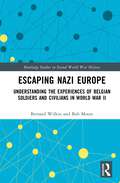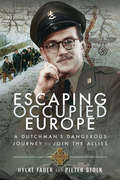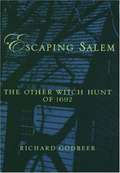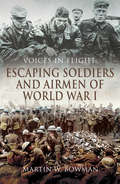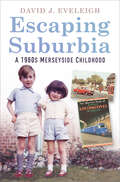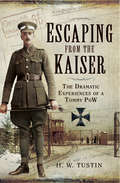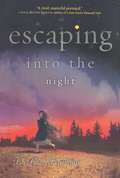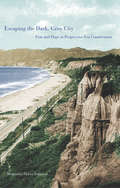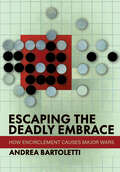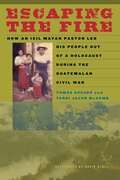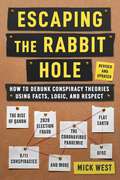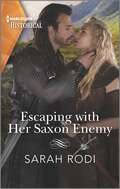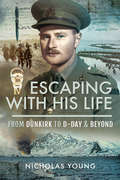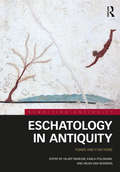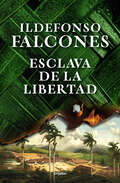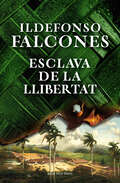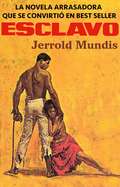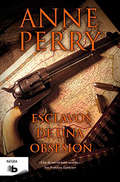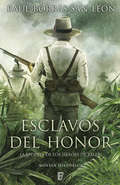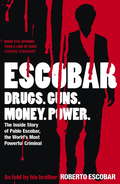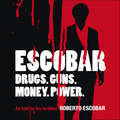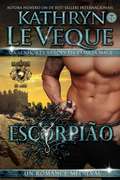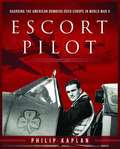- Table View
- List View
Escaping Nazi Europe: Understanding the Experiences of Belgian Soldiers and Civilians in World War II (Routledge Studies in Second World War History)
by Bob Moore Bernard WilkinThis book chronicles the escapes attempted by Belgian soldiers and civilians from Nazi-occupied Europe during the Second World War. Insofar as is practical, the authors have tried to let the subjects speak for themselves by making extensive use of their testimonies preserved in archives in Belgium and the United Kingdom. The book begins with the stories of soldiers who managed to evade capture in the summer of 1940 and returned home, and the few that decided to continue the fight and joined the Allied forces in the United Kingdom. It also includes the prisoners of war who managed to escape from camps or Arbeitskommando inside the Reich and provides a detailed analysis of their narratives: their motivation for going on the run, their choices on when and how to travel, and the many obstacles they encountered along the way. Most escapees were content to return home, with some then joining resistance organisations, but a small minority were committed to joining the Allies, and further chapters recount their attempts to reach Spain and Switzerland, and the additional problems they encountered in those neutral states. Final chapters reflect on the penalties inflicted on prisoners of war who were recaptured and on the escapees’ struggle for recognition in the post-war world.
Escaping Occupied Europe: A Dutchman's Dangerous Journey to Join the Allies
by Hylke FaberIt is 1943, and in occupied Holland the Nazis have declared that all students must sign a Declaration of Loyalty, or face the penalty of forced labor in Germany. Medical student Danil de Moulin refuses. A member of the Dutch resistance and in danger of being arrested and sentenced to death, he decides to escape to England and join the Allies to fight the Axis occupation of his motherland.Escaping Occupied Europe tells the remarkable story of De Moulins journey in his own words. His engaging and authentic style make this a unique document about the journey undertaken by Dutch men and women - 'Engelandvaarders' - during the war.'When, moments later we turned to look, we saw that the Gestapo was driving slowly behind us. There was no doubt that we were being followed. This realization, although sensational, was anything but pleasant We were convinced that we had been caught and expected to be arrested at any moment. It was odd, really, that we were so calm and talked nonsense about how we might harass the Nazis during our interrogation'
Escaping Salem: The Other Witch Hunt of 1692
by Richard GodbeerIn the spring of 1692, a servant girl in Stamford, Connecticut, began to have strange fits of writhing and shrieking. Her case soon captured the attention of ministers and magistrates, as it appeared to be the result of witchcraft. Two hundred miles to the north, eastern Massachusetts was in the throes of a witchcraft crisis that cost the lives of twenty people and left 150 in jail for months. Despite the furor over Kate Branch in Stamford, Connecticut did not fall prey to witchcraft hysteria. Godbeer recreates the Stamford case in vivid detail, and offers theories to explain why Connecticut did not become another Salem.
Escaping Soldiers and Airmen of World War I: Escaping Soldiers And Airmen Of World War I (Voices in Flight)
by Martin W. BowmanThis thrilling new volume from Martin Bowman focusses on British, Canadian, Australian and German soldiers and airmen who were captured during the First World War. Determined that they wouldnt spend the rest of the conflict incarcerated uselessly behind bars, they endeavored to escape. These are their stories.All aspects of prison life are covered here, and the author examines the various escape tactics that were employed by British soldiers and airmen held in PoW camps all over Germany and Turkey. In order to provide a balanced account, the author has also uncovered stories of German navy and army escapees who attempted to flee from England.Each chapter is preceded by an account which explains the types of camps used in Britain and Germany, the numbers involved, the food, the camp money system for worker prisoners and a general appreciation of the conditions and chronology. Firsthand accounts from the prisoners themselves are then woven into the picture, creating an authentic sense of the PoW experience.The emphasis of this unique book is placed on the human story of the main characters, the unparalleled action on the Western Front and the interaction and camaraderie experienced between soldiers and airmen held in prison camps in England, Germany and Turkey during the Second World War.
Escaping Suburbia: A 1960s Merseyside Childhood
by David J EveleighBorn into the gap between the eras of austerity and boom, David grew up in Merseyside amid an inexorable tide of progress, developing a fascination with the past. With a vivid eye for detail and boundless childhood curiosity for everything from steam trains to ‘My Old Man’s a Dustman’, his account documents the uneasy relationship between worlds old and new. Featuring unique photographs and authoritative observations on architecture, social and local history based on forty years' work in museums and heritage conservation, Escaping Suburbia offers a different view of the ‘swinging’ sixties.
Escaping from the Kaiser: The Dramatic Experiences of a Tommy POW
by H. W. TustinOnly a week after joining the 8th Durhams in April 1915 Private Herbert Tustin was captured at the Battle of Ypres. He describes the horror of trench warfare, his treatment on being taken a POW and the three day train journey into Germany.There followed 16 months captivity at Rennbahn POW Camp with its hunger, hardships, brutality, work regime, friendships, humour and the different national characteristics of fellow POWs.In late summer 1916 together with a Canadian POW, Gerrie Burk, the author escaped over the wire. For the next 10 days travelling by night, sleeping rough and stealing basic food they headed for Holland. Somehow they miraculously managed to avoid re-capture despite the closest of calls. Once on the Dutch coast they found a boat, SS Grenadier to carry them across the mine-strewn, submarine infested North Sea to England, arriving on 18 September.This amazing story of war, imprisonment, escape and survival concludes with the author's wife recalling the hero's welcome home, the joyful reunion and his proposal of marriage.
Escaping into the Night
by D. Dina FriedmanHalina Rudowski is on the run. When the Polish ghetto where she lives is evacuated, she narrowly escapes, but her mother is not as lucky. Along with her friend Batya, Halina makes her way to a secret encampment in the woods where Jews survive by living underground. As the group struggles for food, handles infighting, and attempts to protect themselves from the advancing Germans, Halina must face the reality of life without her mother. Based on historical events, this gripping tale sheds light on a little-known aspect of the Holocaust: the underground forest encampments that saved several thousand Jews from the Nazis. In telling the story of one girl's survival, Escaping into the Night marks the arrival of a remarkable new voice in fiction.
Escaping the Dark, Gray City: Fear and Hope in Progressive-Era Conservation
by Benjamin Heber JohnsonA compelling and long-overdue exploration of the Progressive-era conservation movement, and its lasting effects on American culture, politics, and contemporary environmentalism The turn of the twentieth century caught America at a crossroads, shaking the dust from a bygone era and hurtling toward the promises of modernity. Factories, railroads, banks, and oil fields—all reshaped the American landscape and people. In the gulf between growing wealth and the ills of an urbanizing nation, the spirit of Progressivism emerged. Promising a return to democracy and a check on concentrated wealth, Progressives confronted this changing relationship to the environment—not only in the countryside but also in dense industrial cities and leafy suburbs. Drawing on extensive work in urban history and Progressive politics, Benjamin Heber Johnson weaves together environmental history, material culture, and politics to reveal the successes and failures of the conservation movement and its lasting legacy. By following the efforts of a broad range of people and groups—women’s clubs, labor advocates, architects, and politicians—Johnson shows how conservation embodied the ideals of Progressivism, ultimately becoming one of its most important legacies.
Escaping the Deadly Embrace: How Encirclement Causes Major Wars (Cornell Studies in Security Affairs)
by Andrea BartolettiEncirclement, Andrea Bartoletti argues, is an essential strategic possibility of the international system and a key trigger of major war. Using historical case studies, Escaping the Deadly Embrace examines how great powers try to escape the two-front war problem and seek to preserve their security. Encirclement is a geographic variable that occurs in the presence of one or two great powers on two different borders of the surrounded great power. The surrounding great powers may not have the capacity to initiate a joint invasion. Yet their threatening presence triggers a double security dilemma for the encircled great power, which has to disperse its army to secure its borders. When the surrounding great powers become capable of launching a two-front attack, the encircled great power initiates war. This situation, disastrous in itself, can also lead to war contagion when other great powers intervene in the new conflict owing to the rival-based network of alliances. Combining archival work and historiographical analysis, Escaping the Deadly Embrace demonstrates the efficacy of this by assessing three major wars: the Italian Wars, the Thirty Years' War, and World War I. These findings, Bartoletti shows, have important implications for future major wars. Challenging the current focus on the US-China rivalry, he argues that the most concerning strategic scenario is the encirclement of China by India and Russia.
Escaping the Fire: How an Ixil Mayan Pastor Led His People Out of a Holocaust During the Guatemalan Civil War
by David Stoll Tomás Guzaro Terri Jacob MccombDuring the height of the Guatemalan civil war, Tomás Guzaro, a Mayan evangelical pastor, led more than two hundred fellow Mayas out of guerrilla-controlled Ixil territory and into the relative safety of the government army’s hands. This exodus was one of the factors that caused the guerrillas to lose their grip on the Ixil, thus hastening the return of peace to the area. In Escaping the Fire, Guzaro relates the hardships common to most Mayas and the resulting unrest that opened the door to civil war. He details the Guatemalan army’s atrocities while also describing the Guerrilla Army of the Poor’s rise to power in Ixil country, which resulted in limited religious freedom, murdered church leaders, and threatened congregations. His story climaxes with the harrowing vision that induced him to guide his people out of their war-torn homeland. Guzaro also provides an intimate look at his spiritual pilgrimage through all three of Guatemala’s main religions. The son of a Mayan priest, formerly a leader in the Catholic Church, and finally a convert to Protestantism, Guzaro, in detailing his religious life, offers insight into the widespread shift toward Protestantism in Latin America over the past four decades. Riveting and highly personal, Escaping the Fire ultimately provides a counterpoint to the usual interpretation of indigenous agency during the Guatemalan civil war by documenting the little-studied experiences of Protestants living in guerrilla-held territory.
Escaping the Fire: How an Ixil Mayan Pastor Led His People Out of a Holocaust During the Guatemalan Civil War
by Tomás Guzaro Terri Jacob McCombDuring the height of the Guatemalan civil war, Tomás Guzaro, a Mayan evangelical pastor, led more than two hundred fellow Mayas out of guerrilla-controlled Ixil territory and into the relative safety of the government army’s hands. This exodus was one of the factors that caused the guerrillas to lose their grip on the Ixil, thus hastening the return of peace to the area. In Escaping the Fire, Guzaro relates the hardships common to most Mayas and the resulting unrest that opened the door to civil war. He details the Guatemalan army’s atrocities while also describing the Guerrilla Army of the Poor’s rise to power in Ixil country, which resulted in limited religious freedom, murdered church leaders, and threatened congregations. His story climaxes with the harrowing vision that induced him to guide his people out of their war-torn homeland. Guzaro also provides an intimate look at his spiritual pilgrimage through all three of Guatemala’s main religions. The son of a Mayan priest, formerly a leader in the Catholic Church, and finally a convert to Protestantism, Guzaro, in detailing his religious life, offers insight into the widespread shift toward Protestantism in Latin America over the past four decades. Riveting and highly personal, Escaping the Fire ultimately provides a counterpoint to the usual interpretation of indigenous agency during the Guatemalan civil war by documenting the little-studied experiences of Protestants living in guerrilla-held territory.
Escaping the Rabbit Hole: How to Debunk Conspiracy Theories Using Facts, Logic, and Respect (Revised and Updated - Includes Information about 2020 Election Fraud, The Coronavirus Pandemic, The Rise of QAnon, and UFOs)
by Mick WestRevised and updated for the first time in 2023—Now includes strategies for debunking conspiracies regarding the coronavirus pandemic, election fraud, QAnon, UFOs, and more. The Earth is flat, the World Trade Center collapse was a controlled demolition, planes are spraying poison to control the weather, and actors faked the Sandy Hook massacre. All these claims are bunk: falsehoods, mistakes, and in some cases, outright lies. But many people passionately believe one or more of these conspiracy theories. They consume countless books and videos, join like-minded online communities, try to convert those around them, and even, on occasion, alienate their own friends and family. Why is this, and how can you help people, especially those closest to you, break free from the downward spiral of conspiracy thinking? In Escaping the Rabbit Hole, author Mick West shares over a decade&’s worth of knowledge and experience investigating and debunking false conspiracy theories through his forum, MetaBunk.org, and sets forth a practical guide to helping friends and loved ones recognize these theories for what they really are. Perhaps counter-intuitively, the most successful approaches to helping individuals escape a rabbit hole aren&’t comprised of simply explaining why they are wrong; rather, West&’s tried-and-tested approach emphasizes clear communication based on mutual respect, honesty, openness, and patience. West puts his debunking techniques and best practices to the test with the most popular false conspiracy theories today (Chemtrails, The Coronavirus Pandemic, 9/11 Controlled Demolition, Election Fraud, False Flags, Flat Earth, The Rising of QAnon, and UFOs)—providing road maps to help you to understand your friend and help them escape the rabbit hole. These are accompanied by real-life case studies of individuals who, with help, were able to break free from conspiracism. With sections on: the wide spectrum of conspiracy theoriesavoiding the &“shill&” labelpsychological factors and other complications(and concluding with) a look at the future of debunking Mick West has put forth a conclusive, well-researched, practical reference on why people fall down the conspiracy theory rabbit hole and how you can help them escape.
Escaping with Her Saxon Enemy (Rise of the Ivarssons #2)
by Sarah RodiA compelling enemies-to-lovers Viking romance from new author Sarah Rodi.Her tempting enemyIs a chink in her armor! Viking shield maiden Svea Ivarsson would far rather face Saxon warriors than be on the run with the fiercely captivating Lord Ashford Stanton, protector to the Saxon king. Reaching Ash&’s family castle, Svea must swap her chain mail for life as a lady. She can wield a sword like an expert, but no training has prepared her for craving the touch of her greatest enemy…From Harlequin Historical: Your romantic escape to the past.Rise of the IvarssonsBook 1: Escaping with Her Saxon Enemy
Escaping with His Life: From Dunkirk to D-Day & Beyond
by Nicholas Young&“A fitting tribute . . . exceptional in covering the duration of WWII as a soldier, commando, POW, escaper, and on through D-Day to Victory.&” —Firetrench Very few British soldiers could lay claim to such a full war as Leslie Young. Having survived the retreat to and evacuation from Dunkirk, he volunteered for the newly formed Commandos and took part in their first operation, the raid on the Lofoten Islands. He fought and was captured in Tunisia. He went on the run before his POW camp at Fontanellato was taken over by the Nazis after the September 1943 Italian armistice. He spent six months on the run in the Apennine mountains aided by brave and selfless Italians. Many of whom were actively fighting their occupiers. He eventually reached Allied lines but not before several of his companions were tragically killed by both German and American fire. On return to England, he immediately signed up for the invasion of North West Europe and despite being wounded eventually fought through to Germany. It is thanks to his son&’s research that Major Young&’s story can now be told. It is an inspiring and thrilling account which demands to be read. &“Nicely retold by his son, Nicholas, this memoir ticks all the boxes . . . An incredible story of one man&’s war. It&’s excellent.&” —WW2Talk &“This wonderful account of the military life of Leslie Young is pure Boys&’ Own Paper stuff, a tale of heroism and daring, of courage and fortitude. An amazing story, brilliantly told.&” —Books Monthly
Eschatology in Antiquity: Forms and Functions (Rewriting Antiquity)
by Helen Van Noorden Hilary Marlow Karla PollmannThis collection of essays explores the rhetoric and practices surrounding views on life after death and the end of the world, including the fate of the individual, apocalyptic speculation and hope for cosmological renewal, in a wide range of societies from Ancient Mesopotamia to the Byzantine era. The 42 essays by leading scholars in each field explore the rich spectrum of ways in which eschatological understanding can be expressed, and for which purposes it can be used. Readers will gain new insight into the historical contexts, details, functions and impact of eschatological ideas and imagery in ancient texts and material culture from the twenty-fifth century BCE to the ninth century CE. Traditionally, the study of “eschatology” (and related concepts) has been pursued mainly by scholars of Jewish and Christian scripture. By broadening the disciplinary scope but remaining within the clearly defined geographical milieu of the Mediterranean, this volume enables its readers to note comparisons and contrasts, as well as exchanges of thought and transmission of eschatological ideas across Antiquity. Cross-referencing, high quality illustrations and extensive indexing contribute to a rich resource on a topic of contemporary interest and relevance. Eschatology in Antiquity is aimed at readers from a wide range of academic disciplines, as well as non-specialists including seminary students and religious leaders. The primary audience will comprise researchers in relevant fields including Biblical Studies, Classics and Ancient History, Ancient Philosophy, Ancient Near Eastern Studies, Art History, Late Antiquity, Byzantine Studies and Cultural Studies. Care has been taken to ensure that the essays are accessible to undergraduates and those without specialist knowledge of particular subject areas.
Esclava de la libertad
by Ildefonso FalconesUna historia fascinante que narra la apasionada lucha por la libertad de dos mujeres negras en épocas distintas: la Cuba esclavista colonial y la España del siglo XXI. Cuba, mediados del siglo XIX A la isla caribeña arriba un barco portador de una siniestra carga. Más de setecientas mujeres y niñas secuestradas de su África natal llegan para trabajar, hasta la extenuación, en los campos de caña de azúcar y parir hijos que serán también esclavos. Kaweka es una de ellas, una muchacha que vivirá en primera persona el horror de la esclavitud en la hacienda del cruel marqués de Santadoma, pero que pronto demostrará a quienes la rodean que posee la facultad de comulgar con Yemayá. Esta es una diosa voluble que, en ocasiones, le concede el don de la curación y le proporciona la fuerza para liderar a sus hermanos de raza en la lucha por la libertad contra unos opresores que han logrado esclavizar sus cuerpos, pero no sus almas. Madrid, época actual Lita, una joven mulata, es hija de Concepción, la mujer que lleva toda la vida sirviendo en casa de los marqueses de Santadoma, en pleno barrio de Salamanca, al igual que hicieron sus antepasadas en la Cuba colonial. A pesar de tener estudios y ambición profesional, la precariedad laboral obliga a Lita a recurrir a los todopoderosos señores de Santadoma en busca de una oportunidad en la banca propiedad del marqués. A medida que se sumerge en las finanzas de la empresa y en el pasado de esta riquísima familia, la joven descubre los orígenes de su fortuna y decide emprender una batalla legal en favor de la dignidad y la justicia, que merecen tanto su madre como todas las mujeres que entregaron sus vidas al servicio de unos blancos que nunca las trataron como a iguales. Una deslumbrante novela sobre dos mujeres valientes que combatirán, cada una con sus armas, el racismo y la injusticia, escrita por el autor español de novela histórica más importante de nuestro tiempo. Un rendido homenaje al papel de las mujeres en su lucha por la justicia y la libertad.
Esclava de la llibertat
by Ildefonso FalconesUna història fascinant que narra la lluita apassionada de dues dones negres per aconseguir la llibertat, en èpoques diferents: la Cuba esclavista colonial i l'Espanya del segle XXI. Cuba, mitjan segle XIX A l'illa del Carib arriba un vaixell portador d'una càrrega sinistra. Més de set-centes dones i nenes, segrestades a la seva Àfrica natal, hi arriben per treballar, fins a l'extenuació, als camps de canya de sucre i per parir fills que seran tan esclaus com elles. La Kaweka és una d'aquelles nenes que viurà en primera persona l'horror de l'esclavitud a la hisenda del cruel marquès de Santadoma, tot i que aviat demostrarà que té la facultat de combregar amb Iemaià, una deessa voluble que de vegades li concedeix el do de curar els malalts i que li proporciona la força per liderar els germans de raça en la seva arriscada lluita per la llibertat contra uns opressors que els han esclavitzat els cossos, però no les ànimes. Madrid, època actual La Lita és una jove mulata, filla de la Concepción, que s'ha passat la vida servint a la casa dels marquesos de Santadoma, al barri de Salamanca, tal com van fer les seves avantpassades a la Cuba colonial. Tot i tenir estudis i ambició professional, la precarietat laboral l'empeny a recórrer als totpoderosos senyors de Santadoma per aconseguir una oportunitat a la banca propietat del marquès. A mesura que se submergeix en les finances de l'empresa i en el passat d'aquesta riquíssima família, la Lita descobreix quins són els orígens de la seva fortuna i decideix emprendre una batalla legal per la dignitat i la justícia, que mereixen tant la seva mare com totes les dones que van lliurar la vida al servei d'uns blancs que mai no les van tractar com a iguals. Una novel·la enlluernadora sobre dues dones valentes que combatran, cadascuna amb les seves armes, el racisme i la injustícia, escrita per l'autor de novel·la històrica més important del nostre temps. Un homenatge sentit al paper de les dones en la lluita per la justícia i per la seva llibertat.
Esclavo
by Jerrold Mundis Natalia Prieto MasantaUna novela cruda y desenfrenada sobre la esclavitud en el Sur Profundo. Sacudida por la agitación y las turbulencias que precedieron a la Guerra de Secesión, la plantación Ackerly se encuentra sumida en un frenesí de violencia, crueldad y odio. Aquí puede verse la salvaje realidad de la esclavitud: hombres y mujeres vendidos en subastas, jóvenes forzadas a satisfacer la lujuria de sus amos, esclavos torturados hasta ser despojados de todo excepto del instinto de contraatacar... de matar. Amos y esclavos, esclavos y amos, unidos por pasiones palpitantes igual de poderosas. Delia: Fiel esposa y joven madre, sin más derechos que los de una esclava, quien pierde a su hijo en un brutal accidente y debe huir de su esposo para escapar de la lujuria de su amo. Jud: Esposo de Delia. Se atrevió a amarla con todo su ser. Pero una de las damas ricas y bien educadas de la plantación lo pretende para satisfacer sus deseos. Y Samuel Ackerly, amo y señor, sufre en soledad y vaga de noche por el área de los esclavos en busca de alguien con quien hablar... mientras Amanda, su esposa, reina en la Gran Mansión y trata de derrocarlo en favor de su hijo, Richard. Richard, destrozado y destructor, portador del horror. Y muchos más. En esta contundente entrega de la arrolladora saga épica Shame and Glory, Jerrold Mundis revela con salvaje realismo la inmoralidad y la depravación de los últimos días de la esclavitud en el Sur Profundo, lo que la convierte en una novela tan estremecedora como inolvidable.
Esclavos de una obsesión (Detective William Monk #Volumen 11)
by Anne PerryAnne Perry demuestra en esta novela que es insuperable en el terreno del crimen victoriano. Nuevo caso para el inspector Monk en el que tendrá que cruzar el Atlántico para seguir los pasos de un asesino. 1861. La guerra de Secesión acaba de estallar en Estados Unidos. En Londres, Daniel Alberton se beneficia de la contienda enriqueciéndose con la venta de armas a ambos bandos. Sin embargo, cuando Alberton y su bella esposa organizan una cena en la mansión familiar, acuden dos invitados americanos dispuestos a comprar un gran cargamento: uno es sureño, encantador pero partidario de la esclavitud; el otro, norteño y ambicioso, ha conquistado a la hija de Aberton. Durante la velada, una persona es brutalmente asesinada y otras dos desaparecen sin dejar rastro; además, alguien roba una partida de armas de los almacenes londinenses. En estas circunstancias, William Monk y Hester Latterly tendrán que cruzar el Atlántico e internarse en el territorio en guerra para seguir los pasos del asesino.
Esclavos del honor
by Raúl Borrás San LeónLa epopeya de los héroes del sitio de Baler. A mediados de 1898, con el inicio de la insurrección filipina y la guerra contra Estados Unidos, la guarnición española de Baler se refugia en la vieja iglesia, único edificio de piedra del pueblo, en espera de la llegada de una columna de socorro. Durante trescientos treinta y siete días resisten, incluso después de la perdida de la soberanía del archipiélago, luchando contra los rebeldes, el hambre, la enfermedad, la traición y la desesperanza... En Esclavos del honor, Raúl Borrás narra con un estilo literario de gran fluidez un episodio fundamental de la Historia de España en el siglo XIX. Sin caer en el patrioterismo, pero sin denigrar a los protagonistas, esta novela, ofrece, a través de personajes que permanecerán durante largo tiempo en nuestra memoria, una visión cercana y emocionante de #los últimos Filipinas#, los héroes del sitio de Baler.
Escobar: The Inside Story of Pablo Escobar, the World's Most Powerful Criminal
by Roberto EscobarThe incredible bestselling true story of the rise and reign of the most wanted criminal in history, told by the one man who was with him every step of the way - his brother Roberto.Murderer, philanthropist, drug dealer, politician, devil, saint: many words have been used to describe Pablo Escobar, but one is irrefutable - legend. For the poor of Colombia, he was their Robin Hood, a man whose greatness lay not in his crimes, but in his charity; for the Colombian rich he was just a bloodthirsty gangster, a Bogie Man used to scare children in their beds; for the rest of the world flush with his imported cocaine, he was public enemy number one. During his reign as the world's most notorious outlaw, he ordered the murder of thousands - at one point even bombing a passenger jet - smuggled drugs into the US in mini-submarines inspired by Bond films, was elected to parliament, staged midnight escapes through the jungle from whole army battalions, built his own prison, consorted with presidents, controlled an estimated fortune of over $20 billion, and for over 3 years outwitted the secret American forces sent to kill him. His ambition was as boundless as his violence, and neither was ever satisfied. This is the first major, and definitive, biography of this remarkable criminal life, told in jaw-dropping detail by the one man who, more than any other, can understand just how far he came and just how low he fell: his brother, Roberto Escobar.
Escobar: The Inside Story of Pablo Escobar, the World's Most Powerful Criminal
by Roberto EscobarThe incredible bestselling true story of the rise and reign of the most wanted criminal in history, told by the one man who was with him every step of the way - his brother Roberto.Murderer, philanthropist, drug dealer, politician, devil, saint: many words have been used to describe Pablo Escobar, but one is irrefutable - legend. For the poor of Colombia, he was their Robin Hood, a man whose greatness lay not in his crimes, but in his charity; for the Colombian rich he was just a bloodthirsty gangster, a Bogie Man used to scare children in their beds; for the rest of the world flush with his imported cocaine, he was public enemy number one. During his reign as the world's most notorious outlaw, he ordered the murder of thousands - at one point even bombing a passenger jet - smuggled drugs into the US in mini-submarines inspired by Bond films, was elected to parliament, staged midnight escapes through the jungle from whole army battalions, built his own prison, consorted with presidents, controlled an estimated fortune of over $20 billion, and for over 3 years outwitted the secret American forces sent to kill him. His ambition was as boundless as his violence, and neither was ever satisfied. This is the first major, and definitive, biography of this remarkable criminal life, told in jaw-dropping detail by the one man who, more than any other, can understand just how far he came and just how low he fell: his brother, Roberto Escobar.(P) 2009 Hachette Audio
Escorpião
by Kathryn Le VequeEscorpião: Parte da série “Alcateia do Lobo” Um cavaleiro selvagem e heroico encontra o amor no coração da Inglaterra 1289 d.C. — Sir Kevin Hage, sofrendo pela perda do objeto de suas afeições para o guerreiro galês conhecido como Serpente, mergulha na guerra para esquecer as suas mágoas. Ele viaja para o Levante para lutar contra os infiéis muçulmanos, transformando-se durante este tempo. Ele se torna endurecido, brutal e heroico, e retorna à Inglaterra como um outro homem, um assassino inglês conhecido como Escorpião. Agora, na frente de combate doméstico, ele deve lutar uma batalha ainda maior — o medo de amar uma mulher sob circunstâncias extraordinariamente difíceis e com todas as chances contra eles. Acompanhe a história de Kevin e sua dama, em sua jornada de descobertas e aventuras, e o despertar de um amor que é maior do que todas as estrelas no céu, neste romance medieval inesquecível. Amor... teu nome é ESCORPIÃO.
Escort Pilot: Guarding the American Bombers Over Europe in World War II
by Philip Kaplan Andy SaundersSpitfire, Mustang, Lightning, Thunderbolt? in the darkest days of World War II, these legendary fighters escorted lumbering heavy bombers over enemy territory, providing protection, drawing cover, and taking on everything Germany’s Luftwaffe could throw at them.Escort Pilot is the lavishly-illustrated celebration of these unique heroes, painstakingly researched and beautifully designed. It conjures up the lost world of these daring US, British, and other Allied pilots. Readers witness gripping, first-hand accounts of deadly dogfights over Germany, accompanied by warm, humorous personal reminiscences of life on the ground, accompanied throughout by hundreds of period photos and reproductions of vintage artifacts and keepsakes - many in full color.Filled with engaging anecdotes, little-known fighter lore, and a wealth of fascinating and colorful details you’d expect ? from favorite, long-forgotten local pubs to personalized flight jacket artwork ? Escort Pilot is a richly evocative reminiscence of a heroic era and the larger-than-life personalities that inhabited it.
Escort in Deep
by K. A. FoxLeah loves her job as an escort. As her manager's top girl, she is classy, professional, and very, very expensive.When she is given a job for a threesome with a married couple, she expects the typical run of the mill husband and wife looking to spice up their marriage a little.It isn't until Mathew and Tate arrive that she realises she couldn't have been further from the mark.She has never broken her own set rules before but there's a first time for everything.
